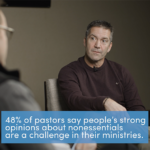
Conviction isn’t just the assurance that you’re right but that being right matters. Your church needs you to lead with that conviction.
By Jason Allen
Conviction is a confidence, rooted in principled clarity and moral certainty, of the rightness of your position and that your stand is not only appropriate but essential. Put another way, conviction isn’t just the assurance that you’re right but that being right matters. And the courage of those convictions is demonstrated when it matters most.
Conviction, too, is contextual. It’s easy to be resolved in the abstract, but conviction only truly matters in contexts of adversity, with real or potential hardship. As Thomas Carlyle famously put it: “But indeed, conviction, were it never so excellent, is worthless till it convert itself into conduct.”
My friend Albert Mohler helpfully writes: “A conviction is a belief of which we are thoroughly convinced. I don’t mean that we are merely persuaded that something is true, but rather that we are convinced this truth is essential and life-changing. We live out this truth and are willing to die for it.”
Convictional courage
To better grasp conviction, consider two illuminating passages of Scripture. The first, from the Old Testament, is well known by Jews, Christians, and non-Christians alike. The second, from the New Testament, is more obscure. Both passages tell the story of individuals who demonstrated the courage of their convictions in the face of life-or-death consequences.
The Old Testament passage is a tale of monarchial overreach, idolatry resisted, persecution endured, and preservation through flames of fire. Simply put, it’s a tale of unyielding conviction. And note, these are ordinary people, but they demonstrate extraordinary courage.
Nebuchadnezzar answered and said to them, “Is it true, O Shadrach, Meshach, and Abednego, that you do not serve my gods or worship the golden image that I have set up? Now if you are ready when you hear the sound of the horn, pipe, lyre, trigon, harp, bagpipe, and every kind of music, to fall down and worship the image that I have made, well and good. But if you do not worship, you shall immediately be cast into a burning fiery furnace. And who is the god who will deliver you out of my hands?”
Shadrach, Meshach, and Abednego answered and said to the king, “O Nebuchadnezzar, we have no need to answer you in this matter. If this be so, our God whom we serve is able to deliver us from the burning fiery furnace, and he will deliver us out of your hand, O king. But if not, be it known to you, O king, that we will not serve your gods or worship the golden image that you have set up.”
(Daniel 3:14-18, ESV)
Notice the resolve of these faithful, young Jews before the most powerful man in the world. They held their convictions—faithfulness to the one true God—boldly.
Uncompromising convictions
In response, God did the miraculous. He spared them so that “the fire had not had any power over [their] bodies . . . The hair of their heads was not singed, their cloaks were not harmed, and no smell of fire had come upon them” (Daniel 3:27, ESV). As a result, Nebuchadnezzar was amazed, praised God, and gave Shadrach, Meshach, and Abednego promotions in the kingdom of Babylon (Daniel 3:28–30).
However, I must acknowledge that having this type of conviction doesn’t always have a happy ending. Church history is filled with names of those who died as martyrs. The point is not assured deliverance. The point is faithfulness in the face of scorn, ostracism, and even persecution.
If one is willing to compromise in difficult circumstances, then maybe they never had true conviction to begin with. — @jasonkeithallen Click To TweetIndeed, it can be costly to lead with this type of conviction. But if one is willing to compromise in difficult circumstances, then maybe they never had true conviction to begin with. Perhaps they held opinions rather than convictions. You see, opinions change when push comes to shove. Conviction is rooted and grounded and is not subject to the whim of circumstances.
Conviction despite cost
Next, the New Testament relates a tale of similar courage and similar consequences. Here, shortly after Jesus’s death and resurrection, the apostles Peter and John preached in the face of fierce opposition—but not just opposition, actual persecution:
Now when they saw the boldness of Peter and John, and perceived that they were uneducated, common men, they were astonished. And they recognized that they had been with Jesus. But seeing the man who was healed standing beside them, they had nothing to say in opposition. But when they had commanded them to leave the council, they conferred with one another, saying, “What shall we do with these men? For that a notable sign has been performed through them is evident to all the inhabitants of Jerusalem, and we cannot deny it. But in order that it may spread no further among the people, let us warn them to speak no more to anyone in this name.” So they called them and charged them not to speak or teach at all in the name of Jesus. But Peter and John answered them, “Whether it is right in the sight of God to listen to you rather than to God, you must judge, for we cannot but speak of what we have seen and heard.” And when they had further threatened them, they let them go, finding no way to punish them, because of the people, for all were praising God for what had happened.
(Acts 4:13–21 ESV)
Do you see the convictional courage on display in this passage? Regardless of the cost, Peter and John were resolute. They could not help but preach about Jesus and what He had done. They did not just hold their convictions; they spoke them boldly.
Convictional leadership
For both biblical stories, we must note that these men weren’t needlessly offensive. They weren’t pugnacious by nature. Pointless provocation was not their forte. No, they were far from that.
That’s why we mustn’t confuse antagonism with conviction. Some are like children at recess, picking fights with others just for the sport of it. This isn’t conviction but immaturity and paranoia. Conviction often looks like steel covered by velvet. Firmness delivered with kindness. Fortitude baptized in compassion.
Conviction often looks like steel covered by velvet. Firmness delivered with kindness. Fortitude baptized in compassion. — @jasonkeithallen Click To TweetWe mustn’t assume in our day that social media is the proper venue for convictional stands. In fact, social media is often the worst medium. Hand-to-hand combat on Twitter is usually unproductive. Such harsh, shrill, pointless debate is not what we find in Scripture. It most likely will not help your church body.
Faithful, biblical conviction is the courage to speak when others demand silence. It’s the strength to stand when others bow. It’s the commitment to obey God rather than man. That’s the type of convictional leadership our generation—and your church—desperately need. Your church needs you to lead with conviction.

Jason Allen
Jason is the fifth president of Midwestern Baptist Theological Seminary in Kansas City, Mo. He also serves as an associate professor for preaching and pastoral ministry. He and his wife, Karen, have five children.
Excerpted with permission from Turnaround by Jason K. Allen. Copyright 2022, B&H Publishing.








